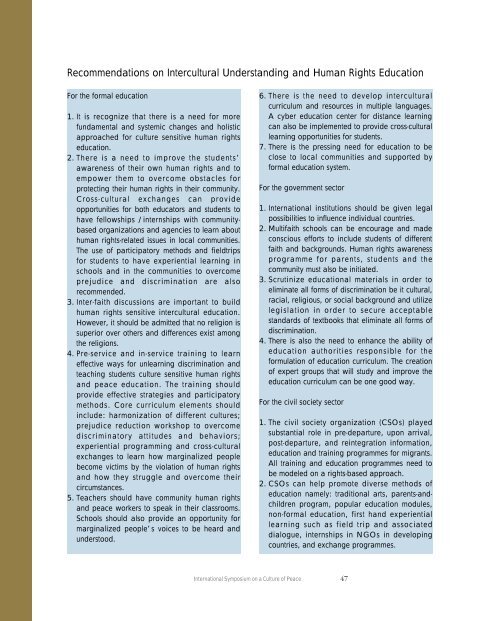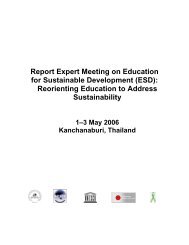Intercultural Understanding and Human Rights Education ... - APCEIU
Intercultural Understanding and Human Rights Education ... - APCEIU
Intercultural Understanding and Human Rights Education ... - APCEIU
Create successful ePaper yourself
Turn your PDF publications into a flip-book with our unique Google optimized e-Paper software.
Recommendations on <strong>Intercultural</strong> <strong>Underst<strong>and</strong>ing</strong> <strong>and</strong> <strong>Human</strong> <strong>Rights</strong> <strong>Education</strong><br />
For the formal education<br />
1. It is recognize that there is a need for more<br />
fundamental <strong>and</strong> systemic changes <strong>and</strong> holistic<br />
approached for culture sensitive human rights<br />
education.<br />
2. There is a need to improve the students<br />
awareness of their own human rights <strong>and</strong> to<br />
empower them to overcome obstacles for<br />
protecting their human rights in their community.<br />
Cross-cultural exchanges can provide<br />
opportunities for both educators <strong>and</strong> students to<br />
have fellowships /internships with communitybased<br />
organizations <strong>and</strong> agencies to learn about<br />
human rights-related issues in local communities.<br />
The use of participatory methods <strong>and</strong> fieldtrips<br />
for students to have experiential learning in<br />
schools <strong>and</strong> in the communities to overcome<br />
prejudice <strong>and</strong> discrimination are also<br />
recommended.<br />
3. Inter-faith discussions are important to build<br />
human rights sensitive intercultural education.<br />
However, it should be admitted that no religion is<br />
superior over others <strong>and</strong> differences exist among<br />
the religions.<br />
4. Pre-service <strong>and</strong> in-service training to learn<br />
effective ways for unlearning discrimination <strong>and</strong><br />
teaching students culture sensitive human rights<br />
<strong>and</strong> peace education. The training should<br />
provide effective strategies <strong>and</strong> participatory<br />
methods. Core curriculum elements should<br />
include: harmonization of different cultures;<br />
prejudice reduction workshop to overcome<br />
discriminatory attitudes <strong>and</strong> behaviors;<br />
experiential programming <strong>and</strong> cross-cultural<br />
exchanges to learn how marginalized people<br />
become victims by the violation of human rights<br />
<strong>and</strong> how they struggle <strong>and</strong> overcome their<br />
circumstances.<br />
5. Teachers should have community human rights<br />
<strong>and</strong> peace workers to speak in their classrooms.<br />
Schools should also provide an opportunity for<br />
marginalized people s voices to be heard <strong>and</strong><br />
understood.<br />
6. There is the need to develop intercultural<br />
curriculum <strong>and</strong> resources in multiple languages.<br />
A cyber education center for distance learning<br />
can also be implemented to provide cross-cultural<br />
learning opportunities for students.<br />
7. There is the pressing need for education to be<br />
close to local communities <strong>and</strong> supported by<br />
formal education system.<br />
For the government sector<br />
1. International institutions should be given legal<br />
possibilities to influence individual countries.<br />
2. Multifaith schools can be encourage <strong>and</strong> made<br />
conscious efforts to include students of different<br />
faith <strong>and</strong> backgrounds. <strong>Human</strong> rights awareness<br />
programme for parents, students <strong>and</strong> the<br />
community must also be initiated.<br />
3. Scrutinize educational materials in order to<br />
eliminate all forms of discrimination be it cultural,<br />
racial, religious, or social background <strong>and</strong> utilize<br />
legislation in order to secure acceptable<br />
st<strong>and</strong>ards of textbooks that eliminate all forms of<br />
discrimination.<br />
4. There is also the need to enhance the ability of<br />
education authorities responsible for the<br />
formulation of education curriculum. The creation<br />
of expert groups that will study <strong>and</strong> improve the<br />
education curriculum can be one good way.<br />
For the civil society sector<br />
1. The civil society organization (CSOs) played<br />
substantial role in pre-departure, upon arrival,<br />
post-departure, <strong>and</strong> reintegration information,<br />
education <strong>and</strong> training programmes for migrants.<br />
All training <strong>and</strong> education programmes need to<br />
be modeled on a rights-based approach.<br />
2. CSOs can help promote diverse methods of<br />
education namely: traditional arts, parents-<strong>and</strong>children<br />
program, popular education modules,<br />
non-formal education, first h<strong>and</strong> experiential<br />
learning such as field trip <strong>and</strong> associated<br />
dialogue, internships in NGOs in developing<br />
countries, <strong>and</strong> exchange programmes.<br />
International Symposium on a Culture of Peace 47








